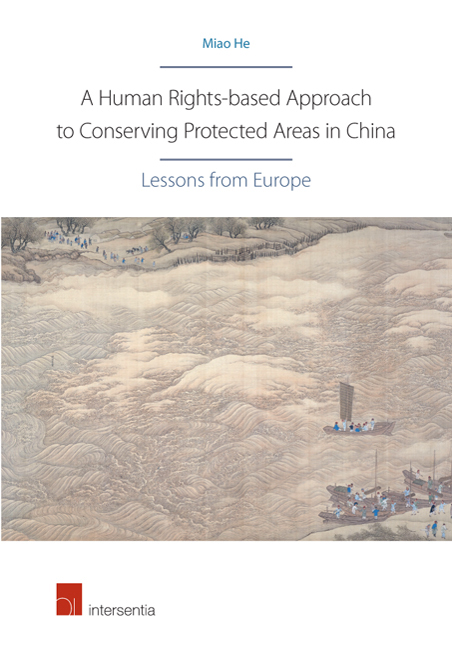Book contents
- Frontmatter
- Contents
- List of Abbreviations
- PART I INTRODUCTION AND BACKGROUND
- PART II ANALYSIS OF THE RELATIONSHIP BETWEEN HUMAN RIGHTS AND PROTECTED AREAS CONSERVATION IN CHINA AND IN EUROPE
- Chapter 3 Protected Areas Conservation in China and in Europe
- Chapter 4 Substantive Right (Right to Property) and Protected Areas Conservation
- Chapter 5 Procedural Rights and Protected Areas Conservation
- Chapter 6 Conclusions for Part II
- PART III IMPLEMENTATION AND GENERAL CONCLUSION
- References
Chapter 5 - Procedural Rights and Protected Areas Conservation
from PART II - ANALYSIS OF THE RELATIONSHIP BETWEEN HUMAN RIGHTS AND PROTECTED AREAS CONSERVATION IN CHINA AND IN EUROPE
Published online by Cambridge University Press: 22 September 2018
- Frontmatter
- Contents
- List of Abbreviations
- PART I INTRODUCTION AND BACKGROUND
- PART II ANALYSIS OF THE RELATIONSHIP BETWEEN HUMAN RIGHTS AND PROTECTED AREAS CONSERVATION IN CHINA AND IN EUROPE
- Chapter 3 Protected Areas Conservation in China and in Europe
- Chapter 4 Substantive Right (Right to Property) and Protected Areas Conservation
- Chapter 5 Procedural Rights and Protected Areas Conservation
- Chapter 6 Conclusions for Part II
- PART III IMPLEMENTATION AND GENERAL CONCLUSION
- References
Summary
Procedural rights are generally regarded as an aspect of the rule of law and detached from substantive rights. Procedural rights, as entry points for supporting substantive rights, play an irreplaceable role in helping substantive rights come into practice, when an interference occurs. For instance, broad access to information promotes better decisions by mobilising a demand for sustainable solutions to problems. However, procedural guarantees of information and participation can prove insufficient to protect the environment if a fully informed society decides to sacrifice environmental quality in order to advance economic or cultural considerations. Nevertheless, people should be involved in decisions that potentially affect them. To empower people with procedural rights could be a better guarantee for their involvement.
Historically, after the 1972 Stockholm Conference on the Human Environment, environmental scholars and activists began to consider human rights in a more instrumental fashion, identifying those rights whose enjoyment could be considered a prerequisite to effective environmental protection. They focused in particular on the procedural rights of access to environmental information, public participation in decision-making, and access to justice and remedies in the event of environmental harm.
This was confirmed by “Our Common Future” (the Brundtland report) published in 1987. And then, the World Commission on Environment and Development (WCED) adopted a list of proposed legal principles for environmental protection and sustainable development, the first of which reads “all human beings have the fundamental right to an environment adequate for their health and wellbeing”. Principle 6 specifically concerns the right to information and equal access and due process in administrative and judicial proceedings.
After these, the Convention on Trans-boundary Effects of Industrial Accidents was the first international treaty to contain the three procedural environmental rights, which are the right to information, the right to participation and the right to access to remedies (Article 9). Three months later, these three procedural environmental rights were approved in Principle 10 of the Rio Declaration on Environment and Development. It says that: “Environmental issues are best handled with the participation of all concerned citizens, at the relevant level.
- Type
- Chapter
- Information
- A Human Rights-based Approach to Conserving Protected Areas in ChinaLessons from Europe, pp. 169 - 326Publisher: IntersentiaPrint publication year: 2016



